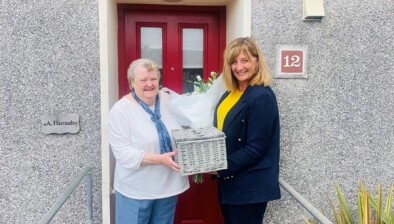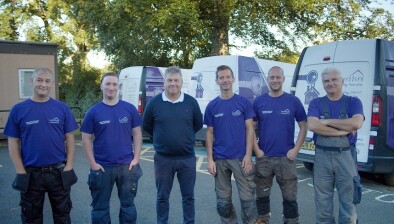Loreburn Housing Association adopts pioneering new technology to help prevent falls in older residents
 Dumfries and Galloway-based Loreburn Housing Association has become the first social landlord in Scotland to adopt new wearable technology that predicts the potential risk of falling for its sheltered housing customers.
Dumfries and Galloway-based Loreburn Housing Association has become the first social landlord in Scotland to adopt new wearable technology that predicts the potential risk of falling for its sheltered housing customers.
With falls currently costing the NHS in Scotland almost half a million pounds a day, the new technology has the potential to save the public purse substantial sums of money by alerting staff, carers and family to intervene to help prevent falls before they happen. It does this by analysing data collected via a smart waterproof wristband which monitors the wearer’s vital health signs 24 hours a day.
Known as ARMED (Advanced Risk Modelling for Early Detection), the new solution - developed by care management technology company CM2000 - involves a wearable device that can detect early indicators of frailty, such as low grip strength, muscle mass, hydration levels, low heart rate and heart rate variability. It combines this device with pioneering predictive analytics modelling - developed in partnership with Edinburgh Napier University – which uses health and social care data to predict escalating risk of a potential fall and supports active self-management.

Following a successful pilot, Loreburn Housing Association is now beginning to roll out the preventative technology to customers within sheltered accommodation. It hopes that by anticipating issues before they arise, the technology will allow customers to live independently in their own homes for longer, significantly improving their wellbeing and quality of life.
Moira Charters, Loreburn Housing Association’s head of partnerships and new initiatives, said: “ARMED has huge and exciting potential to enhance the health, wellbeing and independence of our customers and we are delighted to be the first Scottish housing association to make this commitment to the prevention of falls.
“Loreburn’s collaborative and partnership approach to working supports our strategic vision of creating great places to live and allows us to support our customers to live independently and safely in their own homes for longer.
“Vitally, if ARMED can help our customers avoid unnecessary hospital admissions resulting from falls and the risk of delayed discharge, it will also save money for other parts of the integrated health and social care system in Dumfries and Galloway. Loreburn are delighted to have the support of the Nithsdale Health and Social Care locality in rolling out this innovative wearable technology.”
 Brian Brown, CM2000’s director of Scotland, and the driving force behind the development of ARMED, said: “With an aging population and increased pressure on health and social care resources, it makes sense to invest in preventative technology. Loreburn Housing Association is a forward-thinking organisation that has demonstrated an unprecedented commitment to reducing risks and improving quality of life for residents by taking the decision to provide ARMED technology to all its sheltered housing residents.”
Brian Brown, CM2000’s director of Scotland, and the driving force behind the development of ARMED, said: “With an aging population and increased pressure on health and social care resources, it makes sense to invest in preventative technology. Loreburn Housing Association is a forward-thinking organisation that has demonstrated an unprecedented commitment to reducing risks and improving quality of life for residents by taking the decision to provide ARMED technology to all its sheltered housing residents.”
Adrian Smales, a research fellow at Edinburgh Napier University, said: “By collecting and analysing this data which will detect early signs of frailty, we hope this will lead to much improved outcomes for Loreburn Housing Assocation’s sheltered housing residents.”
John Bury, a resident at Loreburn Housing Association’s Nithsdale Mills sheltered housing development, said: “This new technology is providing us with something that we haven’t got but that’s desperately needed. My wife has dementia and this technology could help keep us living together for longer, and also give our family reassurance.”
Alison Solley, locality manager for Nithsdale at the Dumfries and Galloway Health and Social Care Partnership, said: “Helping people stay in their homes safely is a priority for all involved in health and social care in Nithsdale. Using technology that is simple to use, helps detect frailty early, and has the capability of preventing falls is really exciting for our Nithsdale residents.”







